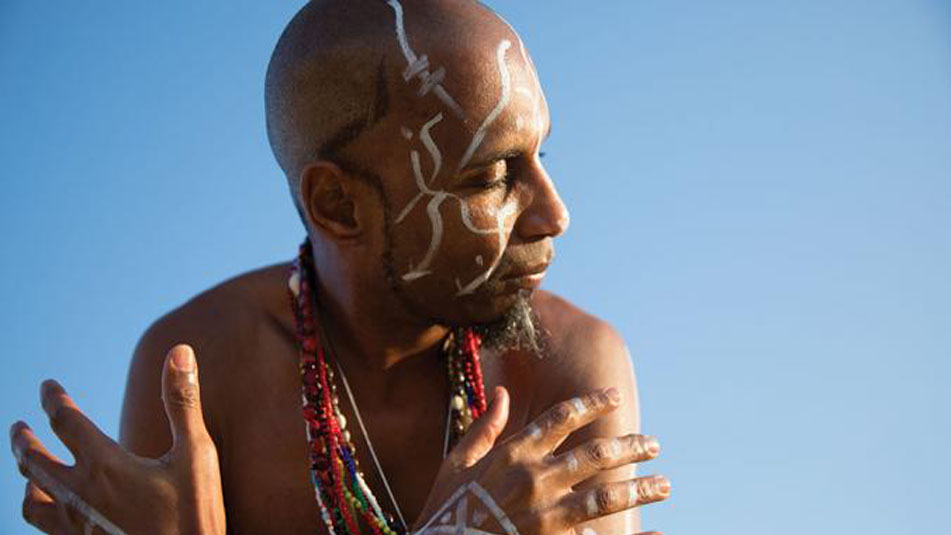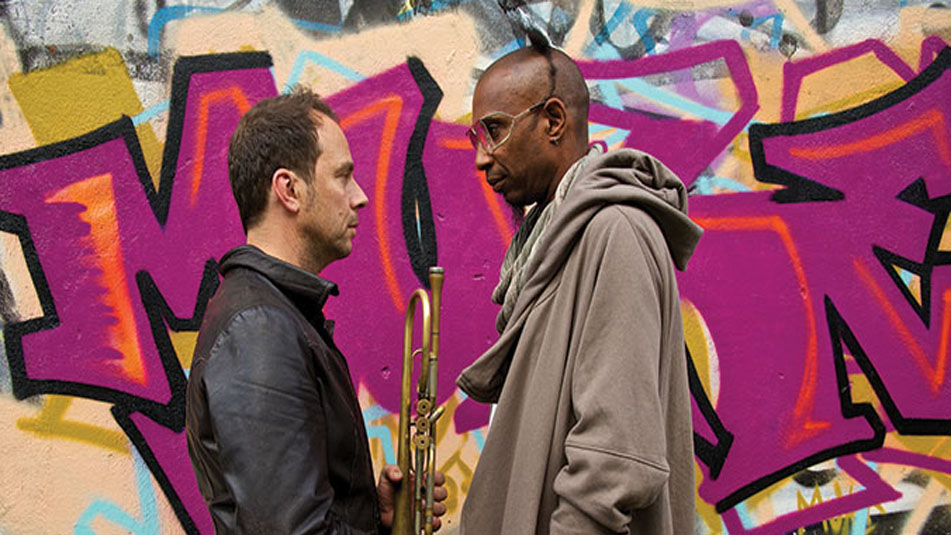OMAR SOSA
UNITY THROUGH MUSIC
March 31, 2017 | by Richard Scheinin

Omar Sosa
Omar Sosa is describing a simple meal.
“You go to Italy, man, and with three ingredients – garlic and pepper and salt – you make an amazing plate with character, good smells, looking good. The same with music: with three notes, you can create a piece. It’s not too different. Food is art, and music is food for the soul.”
If you know Sosa’s music – soulful, unique, deceptively simple -- you understand the analogy.
The Cuban-born pianist and bandleader is helping to lead his country’s music into the future, but he always starts with root ingredients: rich African textures and rhythms, Yoruba invocations – messages from the ancestors. Next he adds spices, a pinch of this or that, flavoring his musical stew with freestyle verse or Moroccan modes, with flamenco wails or the marimba of Esmeraldas, a corner of African-rooted culture on Ecuador’s northwest coast, where he spent time in the early 1990s. Peripatetic by nature – he has settled for years at a time in Oakland and Barcelona, and lately on the Mediterranean island of Minorca -- Sosa may add the sounds of djembe, koto or oud, or he may trigger electronic effects that go rippling through the soundscape. The end result is a serious pleasure: spacious and sensuous, merging elements to create a musical world that seems to rise up from the votive candle that he often sets beside him at the keyboard as he plays.
Then as now, his common denominator – the system that lets Sosa integrate his ingredients – is jazz. Asked to name influences, he cites pianist Thelonious Monk, for the depth of his personal expression, and trumpeter Don Cherry, who spent years traveling about India, Africa and Latin America -- and settled in San Francisco in the late ‘80s and early ‘90s – gathering ingredients for his music, which he called “Multikulti,” shorthand for multi-cultural.
“Basically I follow the philosophy of Don Cherry, who was one of the first to put all these cultures together in the spirit of jazz,” Sosa says. “And what is that spirit? Freedom.”

Omar Sosa and Joo Kraus
He felt it as a boy in Camaguey, drawn to his father’s collection of jazz albums: “Count Basie, Glenn Miller -- and Nat King Cole. He was the top of the mountain for me.” But then his dad brought home a recording by the Conjunto Folklorico Nacional de Cuba with its battery of traditional percussionists: “It was the sacred folkloric music. I listened to that and I listened to Count Basie, and in my head I thought, `Maybe it would sound good to mix it all together -- Count Basie with a lot of traditional percussion in one big majestic band.’ ”
By the time he moved to Havana to study jazz at the Escuela Nacional de Musica, he was already considering an unorthodox path.
“I’m a jazz musician in the philosophic aspect,” he explains. “I don’t play bebop. I don’t play straight-ahead. I don’t play free jazz or swing.” In truth, he can play any of those styles, and well. But here’s his point: “When you take jazz as a philosophy, you can put every single style of music inside that. And in that way, I’m a jazz musician, creating something out of all these traditions together.”
Sosa’s week at SFJAZZ is one of three featuring Cuban music this spring.
Preceding him (April 13-16), is Juan de Marcos Gonzalez, leading his Afro-Cuban All Stars in a celebration of Son cubano, the dance music that became an international craze in the 1930s and later set the stage for salsa. Son has enjoyed a renaissance ever since the Buena Vista Social Club phenomenon of the 1990s, of which Gonzalez was a leader.
Later this spring (May 25-28), three extraordinary pianists – Chucho Valdes, Gonzalo Rubalcaba and Michel Camilo – will join in a tribute to Ernesto Lecuona (1895-1963), the pianist and composer who is a cornerstone of the Cuban piano tradition. Bridging the popular and classical worlds, his influence as a composer in Latin America is often likened to that of George Gershwin in the United States.
“It’s almost as if the past, present and future of Cuban music are coming together with these three programs,” says pianist Rebeca Mauleón, Director of Education at SFJAZZ, “the past meaning the deep tradition of Lecuona’s mastery of the piano and the great nationalism that emerged early in the 20th century when Lecuona was defining the pianistic canon. Juan de Marcos is like the clock that keeps on ticking -- Cuban son is what still gets the Cuban people moving, generally. And Omar Sosa represents the future with his understanding that boundaries can be crossed – and that in fact there are no boundaries.”
Let’s check out the three bands Omar Sosa is leading at SFJAZZ.
His Quarteto AfroCubano (April 20-21) is a family band, in that it includes two fellow Camagueyanos: saxophonist Leandro Saint-Hill, whose older brother was Sosa’s classmate, and drummer Ernesto Simpson, who was Sosa’s best friend, starting around age four. “We spent vacations together. We played baseball together -- he was really good; I was really bad.”
The group also includes bassist Childo Tomas, from Mozambique, who brings “the thump” to the band, Sosa says, an “African stamp.” And it includes master percussionist John Santos, a native San Franciscan – and a close associate of Sosa’s ever since they met on a gig more than two decades ago at the Elbo Room in the Mission: “There was amazing chemistry from day one.”
The JOG Trio (April 22): Imagine Miles Davis playing a looped lullaby in the middle of a tropical sun-shower. The trio includes German trumpeter Joo Kraus and French-Caribbean percussionist Mino Cinelu who – during a night of clubbing in Paris long ago – introduced Sosa to the world of electronics. At SFJAZZ, the band will have a special guest, saxophonist Yosvany Terry, who grew up in Camaguey, part of a distinguished musical family.
Finally there is the GFS Trio (April 23), a band that stands at yet another musical crossroads. Trumpeter Paolo Fresu, from Sardinia, is a pure melodist who “mixes the spirit of Chet Baker with Miles Davis,” Sosa says. Trilok Gurtu, the tabla virtuoso from Mumbai, is “my master, man. I saw Trilok at a festival years ago and introduced myself. I said, `I want to play with you before I die.’ He said, `You don’t have to die. We can play tomorrow.’ And we’ve never stopped.”
And Sosa has never stopped looking for the expressive power behind every note: “It’s about freedom, man, freedom and love and unity. I would love every note I play to unify people in that sense of love. I don’t want to show how fast I can play; when you’re getting old, you play less fast, anyway. I don’t want to show my muscles. I want to play contemplative music, music from my soul, to feel happy with every note and to try and spread that unity and love. Because we all can eat at the same table.”
-- Richard Scheinin
